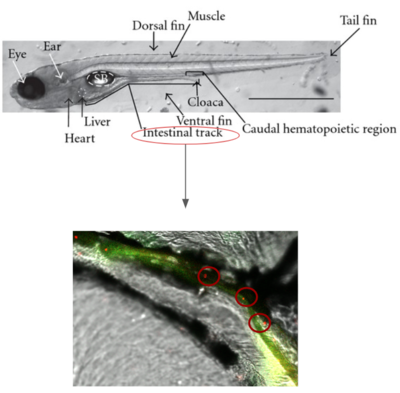Fundamental Biological Factors Underlying Human Performance: From Molecular Diagnostics and Detection to Behavior and Systems Biology: Difference between revisions
No edit summary |
No edit summary |
||
| Line 39: | Line 39: | ||
|Grant number=W911NF-19-D-0001 | |Grant number=W911NF-19-D-0001 | ||
|Start date=14 Feb 2019 | |Start date=14 Feb 2019 | ||
|End date= | |End date=31 Dec 2021 | ||
|Support summary=1 postdoc, 2 graduate students, research technician | |Support summary=1 postdoc, 2 graduate students, research technician | ||
|Project ID=ARL19 zebrafish | |Project ID=ARL19 zebrafish | ||
|ack=This research is supported by the Institute for Collaborative Biotechnologies through contract W911NF-19-D-0001 from the U.S. Army Research Office. The content of the information on this page does not necessarily reflect the position or the policy of the Government, and no official endorsement should be inferred. | |ack=This research is supported by the Institute for Collaborative Biotechnologies through contract W911NF-19-D-0001 from the U.S. Army Research Office. The content of the information on this page does not necessarily reflect the position or the policy of the Government, and no official endorsement should be inferred. | ||
}} | }} | ||
Revision as of 17:07, 4 September 2021
In collaboration with researchers at MIT (Lauffenburger) and ERDC (Perkins, Vinas) we are using zebrafish as a model organism for studying gut microbiome-brain interactions, with a focus on how the chemistry of the gut microbiome affects organism behavior, including sleep patterns and stress. Zebrafish provide an outstanding platform due to their maturity as a model organism as well as their transparent state as an embryo, allowing imaging of gut microbes and other biological features.
ObjectivesCaltech's portion of the project focuses on two primary tasks:
|
References
- Analysis of Circuits for Dosage Control in Microbial Populations. Sophie J. Walton, Samuel E. Clamons, Richard M. Murray. Senior thesis.
This research is supported by the Institute for Collaborative Biotechnologies through contract W911NF-19-D-0001 from the U.S. Army Research Office. The content of the information on this page does not necessarily reflect the position or the policy of the Government, and no official endorsement should be inferred.
|
|
|
